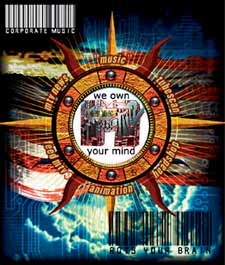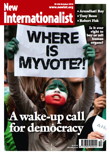Cashing in or selling out?
- Total US gross touring-dollars for the year rose 8.6% to a record $1.7 billion, with record attendance up 6.2% to almost 42 million.8
- Paul McCartney was the top touring artist in the world for 2002, with a global take totalling $126.1 million ($98.8 million in North America alone). U2 held the title for 2001, raking in $109.7 million.8
A cacophony of censorship.
- Index on Censorship has reported 214 cases of music censorship in the last 20 years. A breakdown of these incidents, though not necessarily an accurate reflection of music censorship worldwide, provides some insight.1


- 57% of British students support censorship to younger audiences when musicians use their songs to convey political, violent or sexually explicit material. 38% of students see it as a form of art that should not be censored at all.2
Selling sound
- Britain buys more music per person than any other country - four units each annually.3
- Music products represented more than 25% of all cultural imports and exports in the world's market in 1998, up from 20% in 1980.3
- North America accounted for 41.9% of the value of global music sales in 2002.3
- Since 1997 the main exporter of audio equipment has been Mexico, responsible for 18% of trade in 1998 ($6.2 billion). Most is manufactured in maquilladoras or sweatshops operating in export-processing zones just over the border from the US.3
- There are approximately 420 radio receivers for every 1,000 people in the world: an average of one radio receiver per person in the rich countries compared to one for every four persons in the Majority World.3
The Gang of Four
- In terms of sales, just four corporations - AOLTimeWarner (EMI Group), Vivendi (UMG), Sony (SME) and Bertelsmann (BMG) - control approximately 85% of the global music market.4
- In 2002 the then 'big five' (EMI has since merged with AOLTimeWarner) paid out $67.4 million and distributed $75.7 million in CDs to public and non-profit groups to settle a lawsuit led by New York and Florida over alleged price-fixing in the late 1990s. Consumers were estimated to have been overcharged by $480 million.5
- In the US, four groups - Chancellor, Clear Channel, Infinity and Capstar - control 63% of Top 40 Radio stations (61 million listeners) and 56% of Country Music stations (28 million listeners).6
- Radio, promotional and advertising giant Clear Channel, which owns more than 1,200 radio stations across the US, added only 3,000 songs by just 550 artists to their playlists in 2002.

Musical feudalism
While a select few musicians make millions, the majority are beholden to the record company they signed with and earn a pittance. Steve Albini - an independent record producer famous for his work on Nirvana’s In Utero - suggests that many bands who sign with major labels may be earning about a third the salary of an average convenience-store employee. 9

The music piracy myth
During the recent downturn in the global economy, record companies artificially deflated sales in order to strengthen their arguments that music piracy was severely crippling the industry.

- While it is true that CD shipments were down 10% in 2001, in terms of revenue per title, 2000 was the best year in industry history.10
- Companies deliberately reduced the number of recordings manufactured from 38,900 titles in 1999 to a mere 27,000 titles in 2000 and 2001.10
- In both 2000 and 2001, there were fewer new CDs released than in any year since 1993, and revenues per title were at record highs of over $500,000 per title, from a decade-long average of around $400,000.10
- Over the last 5 years, the global recording industry has sold more than 2 billion items of recorded music making a retail value of more than $20 billion.10
Sisters are doing it for themselves

The world’s most recorded artist is a toss-up between Lata Mangeshkar - the ‘Nightingale of India’ - and Bollywood legend Asha Bhosle. Both are extremely popular and prolific Indian film singers and they also happen to be sisters. Between them they have recorded nearly 100,000 songs in over 20 different languages.11
- Martin Cloonan and Reebee Garofalo, Policing Pop, Temple University Press, US, 2003, based on data collected by Index on Censorship.
- Index on Censorship and Orange, Rebel hearts heed authority's words. indexonline
- UNESCO Institute of Statistics (UIS), International Flows on Selected Cultural Goods 1980-98
- US Federal Trade Commission, Statement of Chairman Robert Pitofsky and Commissioners Sheila F Anthony, Mozelle W Thompson, Orson Swindle, and Thomas B Leary, www.ftc.gov/os/2000/09/musicstatement.htm
- Curtis Lee Fulton, 'Record Labels Pirated American CD Customers Too', The Online Reporter, 11 October 2002, Issue 317, New York and London.
- Recording Industry Association of America (RIAA) and other industry groups as well as the Future of Music Coalition, Association for Independent Music and the American Federation of Musicians, Joint Statement on Current Issues in Radio
- US Commerce Committee hearing, Media Ownership: Radio Industry, 30 January 2003,
- Billboard Magazine, 13 April 2003.
- Steve Albini, The Problem with Music
- George Ziemann, 'RIAA's Statistics Don't Add Up to Piracy', Mac Wizards Music, 11 December 2002,
- Based on statistics mentioned in Broughton, Ellingham, Muddyman and Trillo, World Music: The Rough Guide, London, 1994 and estimates of recordings made since 1991.
This first appeared in our award-winning magazine - to read more, subscribe from just £7





Comments on Sound Facts
Leave your comment
Registration is quick and easy. Plus you won’t have to re-type the blurry words to comment!
Register | Login
...And all is quiet.
Subscribe to Comments for this article
Guidelines: Please be respectful of others when posting your reply.